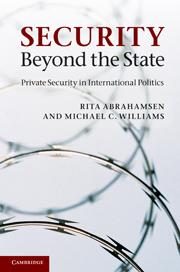2 - Late modernity and the rise of private security
Published online by Cambridge University Press: 05 June 2012
Summary
Security has become a – if not the – dominant discourse of modern life; as Michael Dillon observes, it ‘saturates the language of modern politics. Our political vocabularies reek of it and our political imagination is confined by it.’ Law and order issues, once the terrain of the political right, have become the rallying cry of virtually all political parties, and security is increasingly the lens through which political issues are filtered, be they international migration, health, environmental degradation or development aid. In the wake of the attacks of 11 September 2001, these dynamics have intensified yet further, and the urgent need for security, the containment of danger and the identification and management of any kind of risk have become a pervasive rhetoric. In this sense, Ulrich Beck’s description (though perhaps not his diagnosis) of late modernity as ‘risk society’ appears ever-more accurate: risks, in Beck’s terminology, are open to social definition and construction. They are also insatiable, infinite, ‘a bottomless barrel of demands’.
Any understanding of the role and expansion of private security in contemporary international politics needs to be set against this backdrop of an expanding security agenda. The growth and globalization of private security reflects significant shifts in social and political life, and in economic structures. These transformations are located at the local and national levels, but they are connected to global dynamics and discourses in myriad ways and have combined to give rise to transnational security actors and structures. The task of this chapter is to situate the growth of private security within this broader context and the related reconfiguration of the relationship between public and private power and authority.
- Type
- Chapter
- Information
- Security Beyond the StatePrivate Security in International Politics, pp. 58 - 88Publisher: Cambridge University PressPrint publication year: 2010



